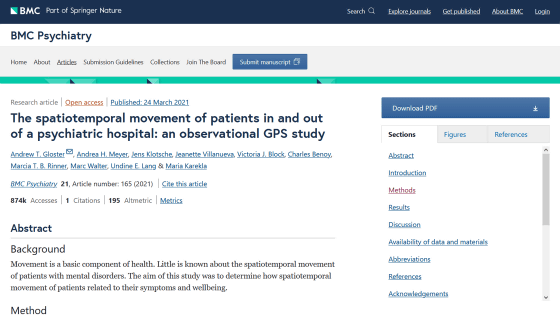``Visiting various places'' may increase the happiness level of people with mental illness

Exercise is known to reduce the risk of various diseases and improve mental health, but strenuous exercise such as jogging or swimming can be exhausting. A study that tracked the movements of people with mental illnesses using GPS found that simply ``visiting different places'' increased patients' happiness levels.
The spatiotemporal movement of patients in and out of a psychiatric hospital: an observational GPS study | BMC Psychiatry | Full Text

Activity is good. Varied activity is better | University of Basel
https://www.unibas.ch/en/News-Events/News/Uni-Research/Activity-is-good-Varied-activity-is-better.html
There's One Simple Aspect of Everyday Life Linked to Better Wellbeing, Study Finds : ScienceAlert
https://www.sciencealert.com/theres-one-simple-aspect-of-everyday-life-linked-to-better-wellbeing-study-finds
Although it has long been known that exercise promotes not only physical health but also mental health, much of the relevant research has focused on the effects of deliberate exercise programs and There aren't many studies on the effects of natural exercise.
Therefore, a research team led by Andrew Gloster, who was a clinical psychologist at the University of Basel in Switzerland at the time of the study, collected smartphone GPS data from 106 patients with mental illness and measured how much the patients moved over a one-week period. tracked.
The subjects had a wide range of mental illnesses, including mood disorders , anxiety disorders , personality disorders , and obsessive-compulsive disorders, and some were admitted to hospitals while others were treated at home. In addition to location tracking, surveys were also conducted on items such as subjective well-being, psychological flexibility, and symptoms of mental illness.
Analysis of GPS movement records and interview results revealed that the greater the subject's spatial and temporal movement, the greater their happiness. On the other hand, the amount of movement had little effect on the symptoms of mental illness itself.

The study found that outpatients showed significantly more movement than inpatients, and that patients with fear or anxiety about leaving a safe place were much less active. However, other symptoms caused by mental illness did not affect the patient's daily movements.
'Our results suggest that while exercise alone is not sufficient to reduce symptoms of mental illness, it can at least improve subjective well-being,' Gloster explains.
Although this study was small and limited, the research team said, ``Our results show that travel patterns (distance, number of destinations, variability of destinations, etc.) are indicators of patients' functional functioning and well-being.'' 'This shows that it can be useful as a tool.'

Related Posts:
in Science, Posted by log1h_ik







